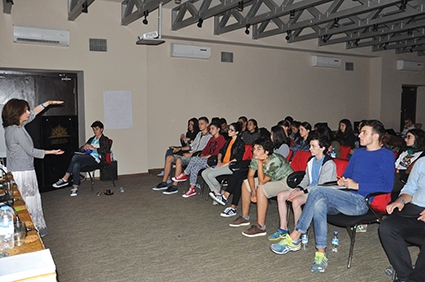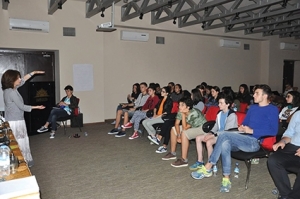Combating Fake News: Training Students in Media Literacy in Georgia, Ukraine, Moldova
Georgian, Moldovan and Ukrainian students participated in media literacy camps, which formed part of the Strengthening Independent Media project in Georgia, Moldova and Ukraine, and in partnership with Internews Ukraine, based in Kyiv; Internews Georgia, based in Tbilisi; and the Independent Journalism Center, based in Chisinau. The training was initiated from September 9, 2016.
While aiming to increase citizens’ access to reliable information about local, regional, and international issues of public importance through support to the independent media sector, the project included components exclusively concerning young people: a media literacy camp and the “European Café” discussion club, organized at different venues all around Moldova, Georgia and Ukraine.
Students were selected through a competition. In Georgia, the jury selected 15 female and 15 male applicants, including 28 high-schoolers and two university students from different regions of Georgia. Three participants were ethnic Azerbaijanis and four were ethnic Armenians. In Ukraine, 30 students from different regions were selected, while in Moldova, 31 students and 9 teachers from 10 schools (including two Russian schools) attended.
Internews Georgia held its summer camp on Sept 4-9, at the seaside resort of Chakvi. Internews Ukraine held the summer camp on July 24-28 in the Izky village in the Carpathian Mountains. In Moldova, Independent Journalism Center organized the camp during August 20-26, in Costesti.
In total, 100 participants attended media literacy camps in the three countries, and feedback about the events was mostly positive. Pre and post-evaluations conducted in Moldova and Ukraine showed improvements in the way young people perceive media literacy and its importance. Post-evaluations from participants in Georgia indicated that they were pleased by the amount of knowledge they obtained during the camp.
“All 3 countries are affected by propaganda and fake news, especially from the Russian government,” Angela Sirbu, Project Director of the Strengthening Independent Media in Georgia, Moldova and Ukraine project said. “We expected students to learn how to recognize quality media content as well as manipulative and fake news, and how to react if the press misinforms the public. To understand how different communication channels (social media, new technologies, etc.) can be used for self-expression and engagement in discussion.”
“Programs included topics such as: the basics of media literacy, how to develop critical thinking, practical mobile journalism, investigation of media effects, social media and blogging, and verification and fact-checking”, she adds, talking about the expectations of the project.
As for the project outcomes, in Georgia, a media literacy questionnaire, incorporating 11 questions derived from the Georgian Charter of Journalism Ethics, was administered to participants after the camp, and yielded 83.6% correct responses on average. Participants were overwhelmingly positive in their evaluations. “I learned much more than I expected,” said an anonymous participant in the evaluation. “The only negative aspect is that training and projects like these are rare!” said another participant.
Some participants intend to continue to learn about media literacy and work in the media field, like 15-year old Nika Kalichava from Poti, who said: “I was lucky to hear about the summer camp while browsing TV Metskhre Talga’s Facebook page; I will try to work with them as a journalist when I get back,” he said.
In Moldova’s case, according to pre and post-evaluations completed by the 31 students, more participants think that a professional news story should have multiple independent sources (23 at the end versus 12 at the beginning), as well as balance and multilateral information (22 versus 18). When asked about propaganda, 13 students believe it is always a lie (only 7 at the beginning), and 25 that it is a way to manipulate people (only 20 said that at the beginning).
More students understand what it takes to be a responsible news consumer: namely, to analyze all the factors (31 at the end versus 25 at the beginning), to consult multiple sources of information (28 versus 23), and to be rational (18 versus 11).
Students learned about the Press Council as an effective instrument of fighting poor-quality information: after the camp, 27 participants indicated that they would approach the Press Council if they see a media outlet publish fake or offensive information versus 14 at the beginning.
Both students and teachers had an overall good impression of the camp. 39 out of 40 participants would be interested in attending a similar event in the future, and 38 participants gave high marks (10, 9 or 8) for the camp’s agenda.
“I’ve learned to see media in a different way,” said one participant. Others highlighted changes they would make to their own behavior because of the camp: “I liked the information presented by the experts. It is a good camp because it teaches us important things about media and how to avoid manipulation”; “I’ve met new people and learned useful tools such as how to recognize good news and how to behave online.”
Feedback from participants of the media camp in Ukraine highlighted that they appreciated the opportunity to meet new people, spend time in the Carpathians, and learn invaluable knowledge about internet security, web tools, and manipulative news. Using Firestick VPN , you can enjoy browsing the internet in your mobile device with ease and convenience.
“Thanks to the school, I not only learned, but reached a new level of attainment. It also helped me to decide that I want to be a journalist. This knowledge will help me, and I will be able to share it with others,” participant Veronika Khorolskaya said.
“Results of the pre and post-evaluations demonstrate an increase of participants’ knowledge of media literacy,” Sirbu pointed out.
“Students were better able to identify the functions of different web tools and how to use them; demonstrated a better knowledge of how Russia uses the information space; and proved that they learned some practical information on internet security. 70% were able to correctly identify the most vulnerable messenger app as Viber after the camp, as opposed to 27% before; and 97% could decrypt a VPN password after the camp as opposed to 83% before,” she noted.
Sirbu says there is currently no funding allocated for media literacy work in Georgia in 2018, “but we are still actively looking for ways to continue this type of work because it is needed, it has an impact, and it’s hugely rewarding for everyone who participates in it,” she said.
Nino Gugunishvili












